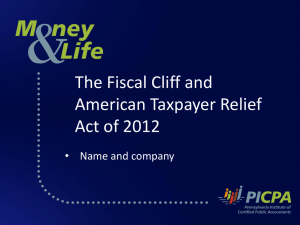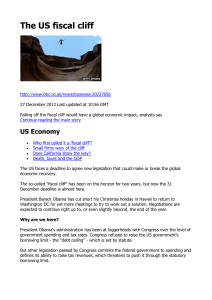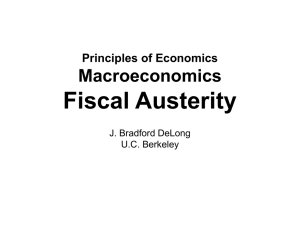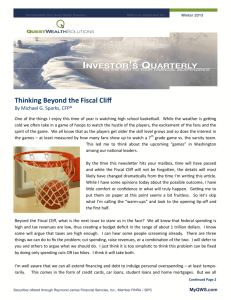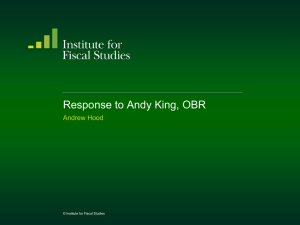Conjecturing Implications from Obama’s Victory s
advertisement
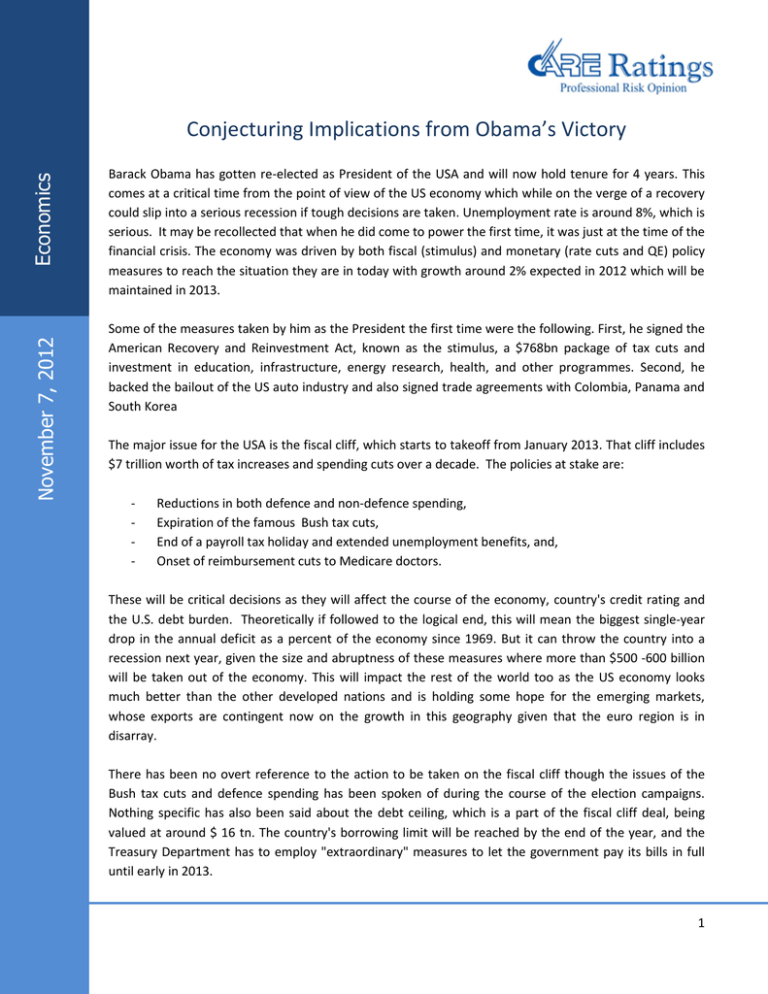
November 7, 2012 Economics Conjecturing Implications from Obama’s Victory Barack Obama has gotten re-elected as President of the USA and will now hold tenure for 4 years. This comes at a critical time from the point of view of the US economy which while on the verge of a recovery could slip into a serious recession if tough decisions are taken. Unemployment rate is around 8%, which is serious. It may be recollected that when he did come to power the first time, it was just at the time of the financial crisis. The economy was driven by both fiscal (stimulus) and monetary (rate cuts and QE) policy measures to reach the situation they are in today with growth around 2% expected in 2012 which will be maintained in 2013. Some of the measures taken by him as the President the first time were the following. First, he signed the American Recovery and Reinvestment Act, known as the stimulus, a $768bn package of tax cuts and investment in education, infrastructure, energy research, health, and other programmes. Second, he backed the bailout of the US auto industry and also signed trade agreements with Colombia, Panama and South Korea The major issue for the USA is the fiscal cliff, which starts to takeoff from January 2013. That cliff includes $7 trillion worth of tax increases and spending cuts over a decade. The policies at stake are: - Reductions in both defence and non-defence spending, Expiration of the famous Bush tax cuts, End of a payroll tax holiday and extended unemployment benefits, and, Onset of reimbursement cuts to Medicare doctors. These will be critical decisions as they will affect the course of the economy, country's credit rating and the U.S. debt burden. Theoretically if followed to the logical end, this will mean the biggest single-year drop in the annual deficit as a percent of the economy since 1969. But it can throw the country into a recession next year, given the size and abruptness of these measures where more than $500 -600 billion will be taken out of the economy. This will impact the rest of the world too as the US economy looks much better than the other developed nations and is holding some hope for the emerging markets, whose exports are contingent now on the growth in this geography given that the euro region is in disarray. There has been no overt reference to the action to be taken on the fiscal cliff though the issues of the Bush tax cuts and defence spending has been spoken of during the course of the election campaigns. Nothing specific has also been said about the debt ceiling, which is a part of the fiscal cliff deal, being valued at around $ 16 tn. The country's borrowing limit will be reached by the end of the year, and the Treasury Department has to employ "extraordinary" measures to let the government pay its bills in full until early in 2013. 1 Economics Some of the scenarios being spoken of, on what President Obama could do are the following: He could veto any bill that averts the defence cuts while leaving intact the non-defence cuts or that ‘fails to ask the most fortunate Americans to pay their fair share.’ He could alternatively, veto any fiscal cliff package if it does not include an increase in tax rates for top earners. What has Obama stood for on the Election Campaign platforms which could show the way ahead? Income-tax rates for most Americans could be held at current levels, but next year could see the Bush-era tax cuts for individuals making more than $200,000 and couples making more than $250,000 expire. The top tax rate would rise to its pre-Bush level of 39.6% from 35%. The capital gains tax rate could increase from 15% to 20% and dividends could be taxed at higher earned income-tax levels. Corporate income tax rate may be reduced from 35% to 28%, while closing specific tax loopholes. Retention of the Patient Protection and Affordable Care Act, otherwise known as ‘Obama Care.’ The Plan strives for universal health care coverage by requiring most people to buy insurance, expanding Medicaid for the poor, and subsidizing insurance coverage. The Plan includes new taxes on investment income, medical devices, and in other areas. In the area of foreign trade, he has helped pass free trade pacts with South Korea, Panama, and Colombia, with modifications designed to relieve concerns of unions. Obama is expected to support retaliatory trade actions against China on wind and solar manufacturing issues. To be in favour of drilling for oil and natural gas in some parts of the country and coastal waters, to help make the nation more energy independent. There would be continued attention on tougher auto efficiency standards and programs to promote renewable energy sources, such as wind and solar, as a part of efforts to reduce pollutants associated with global climate change. The stance has always been on new limits on greenhouse gas emissions and ‘cap and trade’ rules designed to cut carbon pollution, policies opposed by many businesses. A reduction in taxes for small businesses could also be a part of the economic approach taken given the perception that government burden on small businesses is taxes. He has been opposed to a ‘balanced budget amendment,’ but will commit to reducing the nation’s deficits through a balanced approach of spending cuts and higher taxes on more affluent Americans. He favors reduced defence spending in future years. Some economic conjectures on impact of his second term Interest rates: The present regime of easy interest rates may be expected to continue till 2014 as was stated by the Fed earlier. Continuity in such policy would be logical until such time that the economy actually starts growing. Given that there would be certain measures that have to be taken either on taxes or expenditures, the possibility of the economy slowing down cannot be ruled out. While there is no talk of QE4 right now, it cannot be ruled out at a later date. Regulation in the financial sector will continue to be conservative. Conjecturing Implications from Obama’s Victory 2 Economics Exchange rates: The immediate fallout was for the greenback to slip against the euro and yen as traders feel that under Obama the Federal Reserve would continue with the loose monetary policy that has seen it flood markets with billions of dollars. Therefore, the dollar would continue to be under pressure until such time that clarity emerges on the treatment of fiscal cliff. As QE is a part of his lexicon, the dollar will under normal circumstances continue to be under pressure. However, the final movement will depend on how the euro economies fare relatively as trouble seems to be brewing in countries like Spain and Greece once again. Stock markets: The initial reaction has been quite expected. The USA markets have gone down as they see problems ahead. The global markets in Asia have responded well as it is indicative of easy monetary conditions which mean more funds flowing in this direction, which is good news. Indian stocks were also up, ostensibly on this count. A Romney win would have worked in a contrary fashion across these markets. However, these are only initial reactions, which would change soon and it will be business as usual. Global economic prospects: If the US economy slows down, then the world economy will come under pressure as demand moves down. As such nations like China have slowed down; and if USA, which is probably the strongest economy outside Europe among developed nations, slips on account of correction of the fiscal cliff, then there will be problems. Commodity prices: Commodity prices would tend to behave differentially. Gold would tend to gain as the dollar weakens, while metal prices will tend to dip if the USA economy weakens any further on account of fiscal austerity. Indian economy: a slowdown in USA will affect our exports as well as foreign investment flows and hence stability in this economic geography is necessary. Also the rupee will continue to be pressurized based on the dollar-euro relation, though the main guiding force would still be fundamentals. Developments here need to be monitored constantly. Conjecturing Implications from Obama’s Victory 3 Economics Contact: Madan Sabnavis Chief Economist madan.sabnavis@careratings.com 91-022-67543489 Anuja Jaripatke Shah Associate Economist anuja.jaripatke@careratings.com 91-022-67543552 Disclaimer This report is prepared by the Economics Division of Credit Analysis & Research Limited [CARE]. CARE has taken utmost care to ensure accuracy and objectivity while developing this report based on information available in public domain. However, neither the accuracy nor completeness of information contained in this report is guaranteed. CARE is not responsible for any errors or omissions in analysis/inferences/views or for results obtained from the use of information contained in this report and especially states that CARE (including all divisions) has no financial liability whatsoever to the user of this report. Credit Analysis and Research Limited proposes, subject to receipt of requisite approvals, market conditions and other considerations, to make an initial public offer of its equity shares and has filed a draft red herring prospectus (“DRHP”) with the Securities and Exchange Board of India (“SEBI”). The DRHP is available on the website of SEBI at www.sebi.gov.in as well as on the websites of the Book Running Lead Managers at www.investmentbank.kotak.com, www.dspml.com, www.edelcap.com, www.icicisecurities.com, www.idbicapital.com, and www.sbicaps.com. Investors should note that investment in equity shares involves a high degree of risk and for details relating to the same, see the section titled “Risk Factors” of the DRHP. This press release is not for publication or distribution to persons in the United States, and is not an offer for sale within the United States of any equity shares or any other security of Credit Analysis & Research Ltd. Securities of Credit Analysis & Research Ltd., including its equity shares, may not be offered or sold in the United States absent registration under U.S. securities laws or unless exempt from registration under such laws. Conjecturing Implications from Obama’s Victory 4
